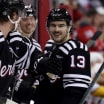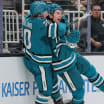Ullmark thrives with Bruins years after struggling with dad's alcoholism
Vezina Trophy contender opens up about rebounding from 'roughest point' of career
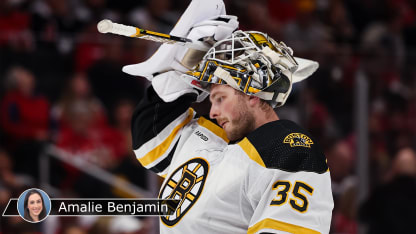
It was a morning skate in the winter of the 2014-15 season, a year before the then-21-year-old goalie would leave Sweden's HockeyAllsvenskan to join the Buffalo Sabres, and nothing was going right. Nothing on the ice -- certainly not that morning -- and little off it.
"I was frustrated," he said. "I sat down and I think that [goaltending coach Maciej Szwoch] asked me, really open, like, 'How is it? What are you thinking?' And then everything just overflowed. The cup got overfilled and then everything just came out after that."
Ullmark was at what should have been one of the highest points of his career, coming off winning the Honken Trophy, given to the goalie of the year in Sweden, in 2013-14, a season when he had a 2.08 goals-against average and a .931 save percentage for Modo in Ornskoldsvik. He had been picked in the sixth round (No. 163) by the Sabres in the 2012 NHL Draft.
It was all lining up.
"I came off a great year, goalie of the year, a lot of expectations," Ullmark, now the Boston Bruins goalie, said this month after having become one of the leading contenders for the Vezina Trophy, awarded to the goaltender voted the best in the NHL. "Everything went [south]. That was when my roughest point was."
Because while the ice was supposed to be his refuge, a place where he could narrow and simplify his focus to the work and the game and the puck in front of him, his off-ice worries had started to creep in. Back home in Lugnvik, a tiny town about an hour southwest of Ornskoldsvik, his father's alcoholism had spiraled.
"I said, 'I don't know what to do,'" Ullmark recalled. "I have no idea what to do. I was thinking about quitting. I was very close to quitting and just moving home. But I got in touch with a psychiatrist that really helped me work through it, work through all of my feelings."
The alcoholism hadn't been a part of Ullmark's life growing up, not that he knew. His father, Jan-Olof, had always been around, helping to drive Ullmark and his brother Tobias, older by four years, to various hockey practices, after a stroke prevented the father from working. They'd always had a good relationship.
Then Tobias moved away, and health issues cropped up, and alcohol became both the solution and the problem.
And now Ullmark knew about it. Now he found vodka bottles around the house, heard the lies his father was telling. Now he worried and ached, the weight settling across his shoulders.
"Especially when you're away and you feel responsible," Ullmark said. "But at the same time, like what they said, he is my dad. I'm not his dad. He is supposed to take care of me. I'm not supposed to take care of him. So I have my own [stuff]. They have their [stuff]. I can't be worrying about their [stuff] when I have my stuff to worry about. But that was a process."
It still is.
Years later, the 29-year-old is in a better place, literally and figuratively. He has gone through healing, through therapy, transitioned into the NHL and from Buffalo to Boston. He has found a measure of peace and been embraced -- again, both literally and figuratively -- by his teammates.
The goalie who celebrated the first win of his professional career by dancing on the ice is having fun, enjoying hockey, scaling the heights of the talent he has always hated mention of because it negates all the work that went into getting him here.
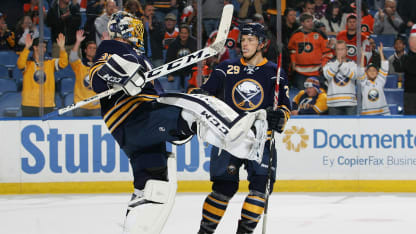
And with that has come a depth, a depth of experience, a depth of feeling, a depth of understanding.
"I think that's been one of his biggest strengths, that he is able to understand the deeper meaning of life," Szwoch said. "Not just ice hockey. But also the deeper lessons that you learn in life."
\\\\
In the beginning, it was the pads that captivated Ullmark. He would take pictures of goaltenders, hold them up to a sunlit window and trace the image onto a sheet of paper, outlining curves and tracing the powerful lines, his own designs following the outlines he had created.
He doesn't draw as much these days, the ideas slipping out of his grip.
"I like to draw," he said. "The problem I have with drawing is that I have to come up with something to draw. And I tend to have a problem with that."
The goalie gear has stuck, though.
But he was never a sure thing. He never thought of himself as particularly good at the position, though he knew he was better at it than at being a skater. He knew only that he liked to stop pucks, that he could stop pucks.
He had gotten cut from his first camp at 15, 16, ahead of a chance at the junior national team. He was one of the worst, he says now, a soccer goalie misplaced in a hockey goalie's pads, saving pucks the wrong way. It was a blow. He had thought he would make it at least to the next step, at least a little further. He had to recalibrate.
He didn't get into a hockey high school, a big thing in Sweden, and had to make do with a local school not far from where he grew up. Then came Modo, where he landed a reserve spot. It was fun, but he was at the bottom of the depth chart.
Still, he was, as Szwoch called him, a "professor, a student of the game." He would pick up on things he saw on YouTube -- something from, say, Pekka Rinne -- and try it out in a game, with no warning, no practice time.
"He was a goaltender with less structure and system of play, compared to the others," said another one of his goalie coaches, Magnus Helin, praising Ullmark's visual processing and reads and his recall of situations on the ice. "But he had a really competitive ability to stop pucks anyway. … He had superb instincts."
The coaches took over, starting with Ian Clark, now the Vancouver Canucks director of goaltending. The puzzle pieces started to fall into place. He discovered that being a goalie was a lot more than just stopping pucks.
That was especially true with Szwoch and Helin, the coaches Ullmark calls "my two father figures."
"They were always there for me in different ways," he said. "If I didn't have those two in my corner, I wouldn't be here today."
Szwoch, in particular, helped Ullmark with the process of growing up, of maturing, comprehending what it meant to play in a professional league. He needed to adapt his conduct, his practice habits, his preparation.
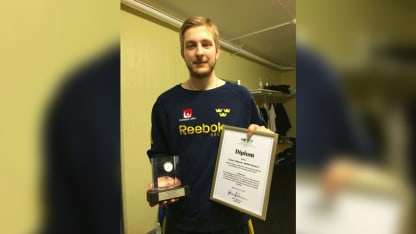
It led to heated exchanges, which sometimes would result in Ullmark complaining to Helin about Szwoch while Szwoch was complaining to Helin about Ullmark. There was one moment that Ullmark recalls now, when after his first win with Modo, the goalie danced, the fans chanting his name, the emotions spilling over, the joy exploding. He did his best Michael Jackson.
"I feel these eyebrows staring at me," he said. "I know, OK, this is not good."
Szwoch took him to task, as did teammate Niklas Sundstrom, a veteran of 750 NHL games with the New York Rangers, San Jose Sharks and Montreal Canadiens. Sundstrom got through.
"Sometimes there was such a thing as when you're having a little bit too much fun on the ice," Szwoch said. "And that's where I needed to help him get back on track and understand the professional part of the game, and also what's expected of you. What leadership means.
"Because as a young kid, that's nothing that comes naturally. That's something that you need to learn by experience. So that's where you had lots of conversations on, 'What's the right thing to do here? How do you prepare? Is there anything we can change or things that we can stop doing?'
"Thankfully, he listened."
\\\\
But as he was listening, as he was learning, the outside began to creep in.
Ullmark can't pinpoint when his father began to lose control. The years have passed and faded, and the mind has fuzzed around the memories -- a self-protection method, he believes. He was a teenager, though, when he found out, after he had left the house to pursue hockey.
"It's kind of a blur, in the sort of way that your brain is protecting you from bad memories," Ullmark said. "I know these things, the times when we went there and I found things and I confronted him. But I can't tell you what year it was, I can't tell you what month it was. And I can't tell you when it started. That's something that only he knew.
"And I can't tell you for sure when he stopped. Did he stop? I don't know. I wasn't home very much. I have two kids. Those sort of things you can only speculate in. In my mind, I try to protect myself, saying that he was recovering all the way until he passed. That's what I live with. That's my truth. But he was never hostile or anything towards me or any of us, what I know."
He struggled that season, 2014-15, and it showed in his numbers. His GAA jumped to 3.12, and his save percentage plummeted to .904. Asked how he was balancing the two sides of his life, Ullmark said, "I didn't. That's the thing. I couldn't balance it."
The safe zone of the rink had vanished, with Ullmark unable to erase his thoughts. He was thinking and worrying, preoccupied with what was going on back in Lugnvik. Every time, it seemed, that he had a bad game or a bad practice, he would inevitably hear from his mother that Jan-Olof was passed out at home with health issues or on the way to the hospital.
"In that type of situation, you're no longer the coach," Szwoch said. "You're just a human being that listens and tries to understand what people are going through. When athletes want to share or when they need to talk about things, we try to be there. So it wasn't a situation where I had to force Linus to talk. When he needed to talk about things, he came to me."
Ullmark also sought the help of Modo's psychiatrist, a person he relied on to communicate what he was going through to the team. Helin also understood where he was coming from, having experienced an alcoholic stepfather who died in 1996, and applauded Ullmark's decision to seek professional help.
For Ullmark, it was invaluable.
His girlfriend at the time and now wife, Moa, had been saying all the same things to him as the team psychiatrist did, all the words that he hadn't allowed to sink in, that he hadn't heard. She was too close. He needed an outsider, someone without connection to him or his life or his friends or his family, to utter the words that would help start to set him right again.
"He was a young kid then. He was devastated, of course," Helin said. "But he's a very smart, smart guy, so he learned strategies. He matured, of course, and realized that it was not his battle to fight. He's always been a very emotional person and he was very attached to his family, his mother and father and brother. He was so close. So it was a tough, tough period for him."
He fought through it. He worked through it. He grew up. He left Sweden. He found a home in Buffalo after three seasons split between the Sabres and Rochester of the American Hockey League.
And then came the pandemic.
\\\\
Lily Ullmark had arrived on Dec. 15, 2020, and two weeks later, Ullmark was on a plane back to Buffalo. They had decided the family -- Moa, their then-2-year-old son, Harry, and Lily -- would remain in Sweden for the season, where his wife could see her parents, where she could get help, where he wouldn't be able to expose them to COVID-19.
He wouldn't see them for five months.
"That was the best option that we had," Ullmark said. "It worked out all right, but it was very tough. It was the toughest part of my life."
He was alone, in Buffalo, cooped up in an apartment without the ability to spend time with his family, with teammates, with anyone. Regulations limited his ability to leave that apartment and the walls began to close in.
"So you're basically stuck in your apartment alone for, I don't know how many hours a day, when you're not at the rink," Ullmark said. "You're stuck there with your thoughts and no one to really let it out. You can let it out by talking to someone on the phone, but it's not the same.
"Even just getting a hug was -- you couldn't do that."
He hadn't been in contact with his father in Sweden, only through phone calls with his mother, who had remained together with Jan-Olof. But when they knew the end was coming -- days or weeks or months away, they weren't sure, as his body broke down from diabetes and other health issues -- the father and son spoke, something Ullmark knew was necessary. He felt better afterward.
Days later, on Jan. 18, 2021, after a tellingly bad morning skate in Philadelphia, his mother called.
Jan-Olof was dead. He was 63.
"How weird it does sound? There was like a weight lifted from my shoulders," Ullmark said. "I think a lot of other people can recognize that feeling of having a loved one that is sick a lot of times because of different things. You know that their end is coming, basically, because they're old and you can see it on them.
"I always said that he is not going to see his 70s, so I kind of prepared myself for that. But nothing prepares you for when they actually pass away."
And yet, there was a measure of relief, a measure of peace that came with his death.
"Daily life was a little bit easier," he said. "Because I didn't have to subconsciously worry all the time. And then I knew that my mom was in a good place as well. She didn't have to worry about all the other things as well and she could focus on herself. It [stinks] to lose your life partner -- it's the worst thing that can happen, except for your kids -- but at the end of the day, that's life."
\\\\
As hard as 2020-21 was, Buffalo was all Ullmark had known. The organization had been a haven for him around his father's death, allowing him to take every bit of time he needed. It had felt safe, a cocoon in a life and career that had gone topsy-turvy at times.
"But when Boston came knocking and I had the opportunity to really think about, OK, maybe I should start a new chapter in my life, it felt like the right way to do it," said Ullmark, who signed a four-year, $20 million contract ($5 million average annual value) with the Bruins on July 28, 2021. "I didn't know at the time how much I actually needed it."
Even so, it wasn't an easy transition.
Even though the Bruins made the Stanley Cup Playoffs last season, even though Ullmark found a friendship and a bond with fellow goalie Jeremy Swayman, even though the organization was succeeding and he with it, there was still a reset that Ullmark and his family had to survive.
They had to get to know a new city, new set of teammates. There were new schools and new grocery stores, new restaurants to try and new playgrounds to find and new friends to make.
This season was different.
"We just flew here, took an Uber to our place and we were home," he said.
It has gone near-perfectly since. Ullmark has emerged as a surprise contender for the Vezina; he is 17-1-1 with a 1.83 GAA and a .938 save percentage, leading the NHL in all three categories.
"Coming into the NHL, Linus has always wanted to be a competitor," Szwoch said. "He wants to be one of the best goalies in the League. So it just seems like a natural step for him to transition into an organization like that and accept that responsibility."
Ullmark cautions that he can take only a little credit for Boston's success, with the Bruins leading the NHL at 23-4-2. He recalls those lessons of long ago, when he first danced on the ice, when his coach and his teammate reminded him that he didn't score any goals, that he was only part of the whole.
Boston goaltending coach Bob Essensa noted how receptive Ullmark has been to tweaks that the Bruins have tried to add to his game, minor technical adjustments that he believes have paid big dividends for a goalie that already came in with good hands and the ability to track pucks well.
"He's a student of the game," Essensa said. "Just from the technical side of things, he understands exactly what works for him and maybe potentially what doesn't."
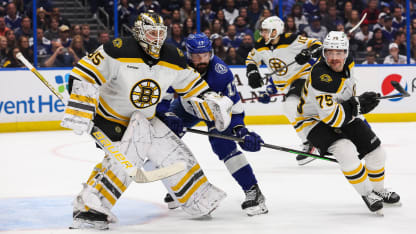
Essensa said Ullmark came to the Bruins as a "push-stop" goalie, meaning that "if there was a rebound or the puck never got through, it's hard on the body because now you're forced to react. It's hard on your groin. It's hard on your hamstrings. It's hard on basically all your joints. Not that he's ever flailing around, but it's hard when you're stuck in one spot.
"So we're just trying to get more fluidity to his game. Which is something that obviously [former Bruins goalie Tuukka Rask] before him was great at and probably led to most of his success."
He wanted Ullmark to have a bit more recoil, even if only a few inches, to get the body in motion. That way, if the goalie allowed a rebound, he would already be moving -- here, Essensa paraphrased Newton's first law of motion, which states that a body in motion stays in motion.
By doing that, Ullmark would have to give up a bit more net than he was used to, with the confidence that his hands would be good enough to combat any extra vulnerabilities. And Essensa can see that on those out-of-position chances or empty-net chances, Ullmark is making plays that he wasn't, before.
"Now," Essensa said, "he sees the end result."
And, he believes, there may still be a higher level possible for the goalie.
That may happen. Or it may not. For now, though, Ullmark is doing well, physically, mentally. He is on a team that is winning -- but, perhaps, more importantly, he is in a new situation, a fresh start, a bandage torn off from old wounds, allowing them to finally see the light, to heal.
"I didn't know how much I needed it at the time," Ullmark said.
\\\\
The way Helin sees it, from afar, it all starts with Maslow's Hierarchy of Needs, the concept that humans require their most basic needs met (physiological and safety before belonging, and love before esteem) on the road to self-actualization.
"In order for people to perform in school or in sports, you need to have confidence, you feel good about yourself and feel good about others," Helin said. "You can't fix things on the ice unless you fix the things that really matter outside the ice."
So it would be simple to connect the dots, to draw a line between his father's death, his exit from Buffalo, his settling into Boston, all the way through to the success that Ullmark has had this season. Simple enough to wonder if a clear head, a comfortable situation and an anvil no longer hanging over him have allowed the goalie to blossom.
But, as Ullmark knows all too well, nothing is ever that simple. There are no fairy tales, no ribbons to tie up in a bow. Through his experiences, Ullmark continues to see the good, how he's become a better person, a better husband, a better father, how he has been empowered to show all his emotions, to feel all his emotions -- from the sadness to the frustration to the anger to the happiness. The spectrum.
He is not in therapy now. He is in a good place. But, he said, he knows the signs. He knows when he should talk to someone. He knows when to lift the valve and let the steam out, strategies honed and internalized.
"Luckily I've never been depressed," said Ullmark, who added that he very rarely drinks or parties and that he has a healthy respect for alcohol, which he hopes to pass on to his children. "But I've been close."
When Ullmark looks at what he went through -- true to form -- he acknowledges that good emerged from the bad. His relationships with Moa, whom he has been with for more than 12 years, and Szwoch and Helin deepened, he learned more about himself than he could have imagined otherwise. He started healing. He grew to understand mental health and what he needed to do to keep himself healthy.
For those parts, he is grateful.
Ullmark also understands, more, what it is to go through the difficult parts of life. He was one of the first to contact Szwoch after a recent accident, the type to always ask about a friend's mother.
"I think I can sort of sense more when people are stressed," Ullmark said. "I can reach out to them and tell them my story. I know how they feel and I can relate. I can tell them what helped me, but not push it onto them."
He is not a finished product, not on the ice, not off it. But Ullmark has grown up, has withstood the fire, has learned how to take care of himself and his family, his empathy heightened, his heart expanding and making him someone that Szwoch called "a beautiful human being."
"I think, in hindsight, it made him stronger," Helin said. "Getting through that in one piece, it will help you handle almost anything that life throws at you, afterwards."

